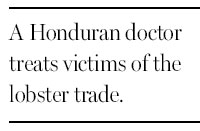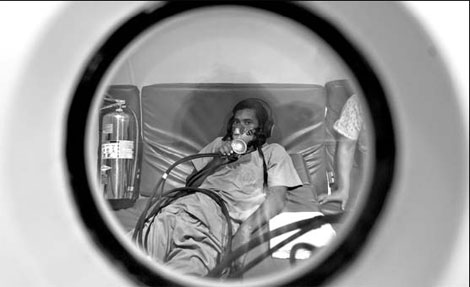Poverty forces Indians to brave deadly dives
Updated: 2011-09-18 07:13
By Elisabeth Malkin(The New York Times)
|
|||||||
|
Wilmer Allen Marly, an Indian diver, had decompression sickness. Edgard Garrido Carrera for The New York Times |
LA CEIBA, Honduras - Since fishing for spiny lobster off the Caribbean coasts of Honduras and Nicaragua became industrialized in the 1980s to meet demand from the United States, the Miskito Indian divers who are the first link in the supply chain have moved farther out to sea as stocks vanish in shallow waters.
The divers descend to depths of 30 to 37 meters, repeatedly diving and resurfacing, pushed by poverty to ignore safety rules. A few die every season; many more are paralyzed by decompression sickness, commonly known as the bends. During a two-week fishing trip, they make as many as 12 to 16 dives a day - no more than two are recommended at that depth - to scrabble for a catch that earns them about $6 a kilogram. (On a productive trip, they may catch 45 kilograms of lobster, but must pay 40 percent in expenses.)
"Here, the problem is strictly about money, where money is given more value than human life," said Dr. Elmer Mejia, who treats sick divers in a hyperbaric chamber at his clinic here. He charges fishing boat owners for treating divers, an average of $300 to $350 per diver.
Aside from the drug trade, most Honduran Miskito Indians have few other ways of making a living.
"The only way to avoid the deaths and the injuries is to shut it down completely," said Dr. Mejia, who calls what is happening to his impoverished patients "economic genocide." "But you can't do that unless you provide alternatives."
Every two or three years, the Honduran government starts to discuss a moratorium. And the Global Fish Alliance, promoted and largely financed by Darden Restaurants, which owns the Red Lobster chain in the United States, has sponsored conferences in La Ceiba to map out alternatives for fishermen, encouraging them to use traps.
But getting into trapping requires capital that few Miskitos have. And trappers employ only a few fishermen, so a wholesale switch would leave most of the 2,100 divers without jobs.

"There is still a lot of lobster being pulled by hand, and it is being chilled and brought to the U.S.," said Eric Douglas, a diving safety expert and author who has studied divers in Honduras, Brazil and Mexico and who has worked with Dr. Mejia. The tuna industry protects dolphins and turtles, but when it comes to lobster fishing "we don't seem to care about the human beings."
Compression sickness occurs when a diver ascends too fast and nitrogen in the bloodstream that is normally expelled by the lungs forms bubbles. The bubbles can lodge in the joints or along the spinal cord, causing paralysis. A bubble that reaches the brain causes an arterial gas embolism, which can be fatal.
In a hyperbaric chamber, the atmospheric pressure is raised to what the diver would experience underwater and then reduced over several hours as the diver breathes oxygen through a mask, allowing the nitrogen to be expelled.
Wilmer Allen Marly, 27, was recently brought to the clinic near death and unconscious. Dazed after treatment, he said, "After this, I don't want to dive anymore. I have small children." A cousin of his died in June in a diving accident. "I have to find something else to do to support us."
Dr. Mejia spoke, almost to himself. There was no sigh, no shrug of resignation, just a simple fact. "He'll dive again."
The New York Times
(China Daily 09/18/2011 page12)
